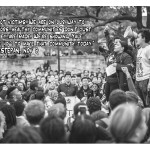by Sohum Pal
In the spring of my senior year of high school, I received an invitation to join the Directed Studies program for my freshman year at Yale. I declined immediately—not because I thought I couldn’t complete the workload or maintain a healthy social life, but because I see the program as a violent reenactor of historical intellectual violence whose echoes continue to be felt in the continued undervaluing of thinkers of color in the academy and broader world.
Directed Studies (DS) is freshman program defined by a set of three year-long courses in Literature, Historical and Political Thought, and Philosophy—among the members of the freshman class, the program is well-known for its large workload. Among much of the community of color, the program is well-known for its preponderantly White and male syllabus.
What I would question, however, is not merely the Whiteness or the preponderance of masculinity in the syllabi. Rather, I am interested in the function of Directed Studies as a vehicle committing violent acts of intellectual privileging against marginalized groups at Yale.
The creation and recognition of a canon is a work of cultural curation: the arbitrary determination of works with “value” and the implicit determination of works which lack that “value.” So what is deemed worthy of inclusion on a DS syllabus? Unsurprisingly for a course that attempts to tackle the teaching of 2500 years of Western cultural history in one year, the fall syllabi are primarily dominated by the works of Greek and Roman authors, with some medieval theologians and Renaissance thinkers appearing at the end. There are some pleasant surprises, of course—fragments of Sappho, an anthology of Classical Arabic philosophy (though, according to one DSer, the anthology “embraces Orientalism”). The truth is, however, that the inclusion of such texts does more to hurt Directed Studies than it does to help the cause of diversifying the syllabus (which is little better than leaving the syllabus as it stands).
Directed Studies would have its students read works of discrete authors from discrete cultural and temporal circumstances, as well as deep studies of specific authors—this is necessary for gaining an appropriately deep understanding of those texts it describes as canonical. The program, however, also presupposes that selections from an anthology of Classical Arabic philosophy is sufficient for describing the immense influences of the Arab-speaking world on the cultural history of the West. However, an anthology–a work of cultural curation and a product of arbitrary powers of taste–can never fill such a vast pedagogical role completely. At best, the inclusion of this anthology pays lip service to diversification while in fact permitting students to accept only a cursory understanding of how the world-outside-Europe profoundly shaped the intellectual trajectories of the constructed West. In placing Sappho as the only woman on the fall syllabi, Directed Studies again does its students a great disservice by failing to present the abundance of woman authors–and implying that women do not have a place in the West’s cultural history. Perhaps most alarmingly of all, a DSer could come away from these syllabi believing that there are few women or other Eastern philosophers worthy of study—after all, they were not included on the curriculum for DS. Thus, the historical marginalization of the thoughts of women and people of color becomes further institutionalized in curricula.
What, too, remains institutionalized in the Directed Studies program is the need for tremendous confidence—the sorts of confidence that often comes with graduating from a school that describes itself as a “prep school,” from having had a host of “enrichment” experiences, from never having been told one’s writing sounded “fresh off the boat–” in order for students to even attempt the program. Directed Studies itself claims that no background is needed to succeed in DS—and no doubt, some of its alumni would agree—but they would prove the exception, especially in the context of its high attrition rates (minimal withdrawal data is available because of shopping period). If a student chooses to apply, and is then placed on the waitlist, those students are told, once again, that they are simply not good enough for Directed Studies—they may be at Yale, but there are still gradations of excellence within that.
I would not condemn the teaching of the works taught in DS, on the whole. Many students, myself included, find those works interesting and compelling. Rather, I find fault with the privileging of the arbitrarily formed Western canon over the body of non-canonical productions, Western or otherwise. By offering this program to freshman at Yale, Yale itself endorses the sentiment that the knowledge foundational to success at Yale (and in the professional world) is a knowledge of European cultural production. The fact is, Aristotelian philosophy and Euripidean tragedy are not “universal,” but normative: cruel colonialism constructed these ideas as “universal,” not an enlightenment.
Why, for example, does a Directed Studies-style course teaching the works of the East or of the Global South not suffice? Why is abolition the only appropriate course of action? Along with issues of reenacted colonial intellectual violence, Directed Studies fails in its curation of a canon for the simple reason that a canon is an incoherent concept.
A canon requires that some works are more valuable and thus more influential than others. The argument of influence is a cyclic one. Works that are studied and cited because of their influence become more influential. It is easy enough, though, to break that cycle and generate new historiographies. It begins with the teaching and study of different works. Rather than describing a work as non-influential, then, we may describe it as not-yet-influential, for it has yet to be subject to the processes of elevation that privilege a production to a state of influence–teaching and reteaching.
If the argument goes that a work should be studied because it is “good” or “great” or “a classic,” then what is there that can underlie that assertion aside from prejudice? Is it great because it was written by a man? By an able-bodied person? By the most mainstreamed type of queer person: cisgender, white, male, and homosexual? The point is that claims of greatness are founded on prejudice. Greatness is not, as the canon may suppose, a fixed or universal concept. It is a determination of arbitrary standards of taste. Classic books, then, are a sham. It is time to put the “Great Books” to rest, since that epithet should be repudiated with the understanding that there is no legitimate hierarchy relating produced knowledge.
Of course it can be argued that the intellectual incoherence of the canon does not insulate reality from the practicable effects of that canon. It’s a common critique of the deconstruction of concepts such as race, gender, and sex. Such a critique has little meaning, however, because the canon’s power is self-perpetuating; the cycle of power-creation can be brought to a halt, and that begins in the academy. The canon is perpetuated in the ivory tower; it is intended to bring together continuities of intellectual and cultural history. We can, in this privileged position, pull at the fraying ends of these continuities, unraveling them for the oppressive constructions they are. We can then recreate histories and teach more egalitarian and liberated histories. It is the unique power of the academy–and the power inherent in critical theory.
What tremendous power the canon has, however, can be tapped and redirected towards lessening the pain of marginalized persons through the teaching and empowering of their narratives. If colonialism is the wound, then Directed Studies is the knife that twists in it. We must remove the knife, if we are to allow marginalized peoples to heal.


